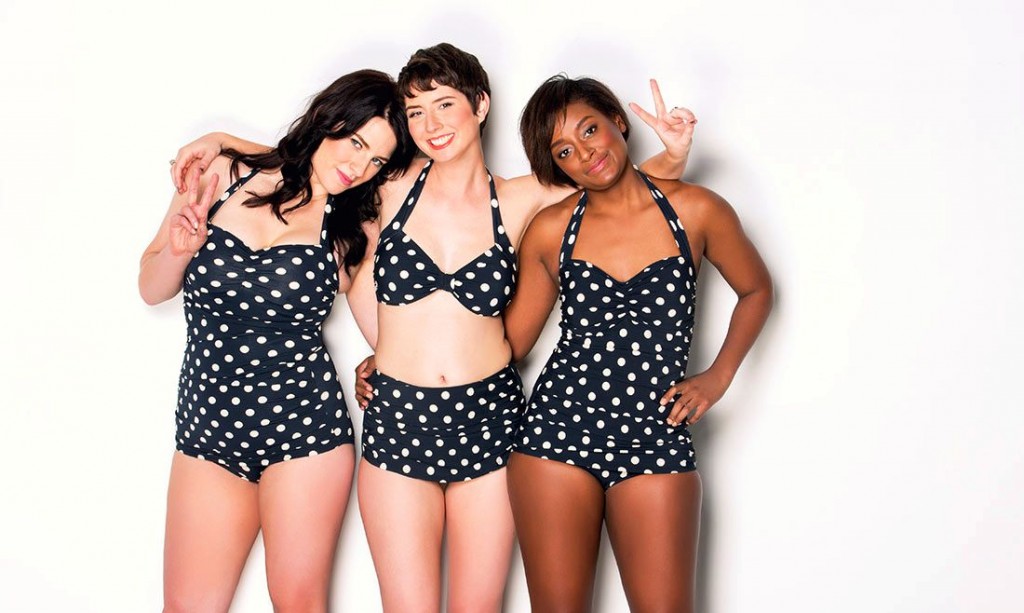SLENDER BODIES, smooth lines, and perfectly even skin are still the norm in most magazines and catalogs, but not all brands have turned a deaf ear to the increasingly louder call for real bodies in advertising and fashion. Women can use their buying power to support clothing brands that support body positivity.
It occurred to me, though, that some of these brands may not have the most ethical labor practices; our efforts to shop with conscience are perhaps more than a little compromised if we buy body-positive clothing produced primarily by women in sweatshops. Here’s a look at several clothing stores for both body-positive and labor practices.
ModCloth
Positivity: Last year, the Brave Girls Alliance published the Heroes Pledge, a call to advertisers, agencies and talent to stop significantly retouching photos of bodies in their work. The online retro clothing store ModCloth was the first to sign the Pledge.
ModCloth has done more on the body-positivity front than sign the Heroes Pledge; along with skipping the extensive digital editing process with their photos, they employ models who represent an array of body types. And, of course, they produce (gorgeous) clothing to comfortably fit those different types.
The Business: It’s not possible to sum up ModCloth’s supply chain in one fell swoop, since the brand sells clothing from a number of different designers and manufacturers, many of which sell clothing made in countries notorious for poor labor practices. ModCloth does offer a category of shops featuring Made in the U.S.A. clothing, as well as a category of sustainably made clothing. It should be noted, however, that “Made in the U.S.A.” isn’t a guarantee against sweatshop labor (more on that to come).
Lane Bryant
Positivity: Lane Bryant made a splash in April this year with their #ImNoAngel campaign, advertising their Cacique line of lingerie for sizes 12 through 28. The hashtag is a clear rebuttal of Victoria’s Secret’s “angels,” who, according to VS, represent the “perfect body” with their narrow range of sizes and shapes. Lane Bryant’s advertisement features voluptuous women in sexy and comfortable lingerie.
Business: Unfortunately, Lane Bryant has a sketchy history both here and abroad in terms of its supply chain. Just last year, 13 workers in a Manhattan factory, which mainly supplies Lane Bryant and Dress Barn, filed a lawsuit for unpaid wages between 2005 and 2010. In 2009, egregious labor rights violations were noted at the Nicotex factory in Guatemala, which produces jackets for Lane Bryant. Way back in 1999, Lane Bryant was one of several companies named in a lawsuit brought up by workers in a Saipan factory for labor abuses. Saipan is a territory of the U.S., and, while it is not held to the same labor standards, it enables clothing companies to label products from the region as “Made in the U.S.A.,” giving a false sense of ethical security to consumers.
Aerie
Positivity: Last year, Aerie launched its #aerieREAL campaign, marking its commitment to cease the use of digital editing in its advertisements. Aerie, an American Eagle brand, is one of the larger to get in on the movement. It won the 2015 National Eating Disorders Association (NEDA) Inspires Seal of Approval for bringing body positivity into the mainstream intimate apparel industry. While its efforts are nothing to sneeze at, it’s worth noting that the company, though offering a good range of sizes, still represents only a narrow range of body types in its advertising.
The Business: American Eagle doesn’t have a very good track record when it comes to labor practices (I think we’re starting to see a trend here). The company’s own scorecard for 2011 and 2012 show high rates of non-compliance to ethics standards in its factories abroad, and, while they are good at performing inspections, and the reports show improvement between the two years, the results are still rather dismal. Free2Work, a research organization that rates brands by their business practices, gave American Eagle a B; that may seem promising, but a closer look at AE’s scorecard shows that the company earned a D in the category of worker’s rights. GoodGuide, another group that researches and assesses business practices, gave American Eagle a measly 4.7 out of a possible 10.
Damn you, affordable, cute underthings!
Etsy
Positivity: Like ModCloth, Etsy carries products from a vast selection of sellers. And several of those retailers are committed to providing clothing for women whose bodies don’t match those of the VS “angels” or those who model Aerie’s clothing. A number of sellers have made it a priority to make fashionable, comfortable clothing for “plus-size” as well as “straight-size” women.
The Business: Etsy was originally “your place to buy and sell all things handmade.” Writing for The Star, Robin Levinson King notes that, in 2013, the company “redefined the definition of handmade to include anyone who had commissioned goods to be made — whether those goods were made in an apartment or a factory in China.” Many of the products now sold on Etsy are therefore likely crafted in factories that do not uphold ethical labor standards. King notes that it can be difficult to tell which sellers use such factories abroad. The best bet is for customers to contact sellers and inquire into their supply chain.
AbbeyPost
Positivity: AbbeyPost is not your typical clothing company; in fact, it’s a software company. Founder and CEO Cynthia Schames explains, “We’re using the power of software to create a highly detailed profile of your unique shape and size, extrapolated from a big database of other people whose bodies are similar to yours.” The company makes custom clothing for each customer at similar prices as one would find in stores like Macy’s. This allows for maximum fit and comfortable as well as style, geared toward women whose body types are not catered to by mainstream clothing lines.
The Business: Until now, AbbeyPost has manufactured its clothing in a factory in Georgia. They were recently acquired by the company Sourceeasy. The plan is to rely on “near-shoring” for manufacturing; whether this means using the Atlanta facility or other factories throughout the 50 states, or relying on nearby countries like Mexico and U.S. territories with more lax practices and standards, remains to be seen. We’re waiting to hear back from Schames for more information about the supply chain moving forward.
Dear Kate
Positivity: When it comes to feminist underthings, Dear Kate may just be the gold standard. (Watch this video of CEO and founder Julie Sygiel and just try not to hug your computer screen.) The company’s mission of female empowerment takes many forms. On the body-positivity front, Dear Kate uses a variety of body types in its advertisements and makes underwear in many sizes. In response to Victoria Secret’s “The Perfect ‘Body’” campaign, Dear Kate released a counter-photo featuring women with diverse figures looking radiant in comfortable, cute undergarments.
Along with body positivity, the philosophy behind the underwear is stellar: Dear Kate underwear is designed to be not only extremely comfortable, but leak-resistant, stain-resistant, and moisture-wicking, providing security to women no matter what time of the month it is – whether we’re at the office or running a marathon.
The Business: Dear Kate is a small operation that works closely with its factory in Queens, New York. Cheap fashion generally comes at a high ethical cost, and ethical fashion generally carries a higher price tag. We can’t all stock up on pricey Kates, but it’s good to know what alternatives are out there should we have the means to avail ourselves of them, if only occasionally.
Know of any other brands at the intersection of body positivity and ethical labor practices? Let the peeps know below.

















